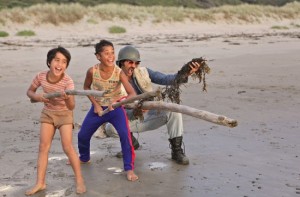 In the ’80s, Michael Jackson was not only the undeniable “King of Pop,†he was a role model and idol to millions. For “Boy,†[which is ironically the name of the film as well] a prepubescent teenager who lost his mother and is forced to live without his jail-bird father, “Jacko†is his escape from the entanglements of life.
In the ’80s, Michael Jackson was not only the undeniable “King of Pop,†he was a role model and idol to millions. For “Boy,†[which is ironically the name of the film as well] a prepubescent teenager who lost his mother and is forced to live without his jail-bird father, “Jacko†is his escape from the entanglements of life.
However, when his father comes back into his life, “Boy†must decide whether to keep his fantasy alive or face that his life is nowhere near as perfect as he wants it to be.
A coming of age tale about life, love and family “Boy†is charming, deep and at times, hilarious, making it a film that can affect an audience in many ways, the majority of them being enjoyable ones.
For one, James Rolleston’s performance of the title character is eye-opening. Not having to stray too far obviously to play this character, Rolleston is a natural as the imaginative and wide-eyed “Boy.†Wanting more than everything to establish a relationship with his father Alamein, played by the lovingly gregarious Taika Waititi, who also directs the film, Boy adopts a lifestyle not his own and sacrifices his innocence along the way to be with a man who takes his time learning what family is all about.
This journey through the self-actualization of both of these characters fuels the story and makes the film immensely entertaining. The fact that the journey takes place in the beautiful scenery of New Zealand helps matters as well. Seeing the wildlife and beautiful landscapes around this very real story further clarifies the notion that Waititi is contempt on showing the beauty of his homeland and the hidden gorgeousness of adolescence and manhood.
However, while the environment plays a role in setting the playful tone of the film, watching Rolleston chit chat with his friends about life and love will remind many of their childhood, while Waititi’s carefree and idiotic ways will put a smile on your face and make you sigh in disgust at the same time. During the course of the film, it becomes obvious that Boy and his younger brother are in desperate need of a father and it’s a shame that they have to settle for a friend instead. Nonetheless, it’s a right of passage for all the parties involved: for Boy to ask more from his father and for Alamein to finally give up the guilt, games and garbage and be the man he knows he has to be, for the sake of his struggling family.
Seeing most of this develop in a fun and at times melodramatic way before getting serious might hurt the overall flow of the film, but it doesn’t take away from Waititi’s overall message that both youth and family are cherished commodities that deserve the majority of our attention.
As a matter of fact, one might argue that Waititi’s changes in tone mirror the wild veracity of life in general, making “Boy†a film that in spite of its inherit wackiness, is much more realistic than you’d originally think.
Because of that, in the end, it’s something worth doing a shoddy moonwalk in tribute of.


Leave a Reply